Covid cases among children in Scotland may already be falling just weeks after schools went back and sparked a fresh wave of infections, in an encouraging sign for the rest of the UK.
Public Health Scotland data suggest Covid cases among under-14s peaked at 1,943 on September 1 after rising consistently for three weeks when classes resumed north of the border.
Infections in the age group fell in the following three days and have hovered at almost 1,500 since.
There was huge concern across the UK when Scotland’s cases rocketed almost three-fold after schools went back in mid-August.
It reignited the debate about whether children aged 12 to 15 should be routinely vaccinated against Covid to keep transmission low and avoid a delayed winter peak.
Professor Chris Whitty and the other chief medical officers are currently weighing up whether to offer jabs to 12 to 15-year-olds, after the Government’s vaccine advisers said the shots only offered a marginal benefit to their health.
Professor Whitty — who said over summer he would be in favour of jabbing kids to prevent more school closures — is expected to OK the move on Friday.
But some SAGE advisers have already said it is too late to vaccinate the age group, saying youngsters should have been jabbed before they returned to the classroom.
They pointed to the eight week gap required after the first dose and the up to three week gap after the second dose before the jabs spark immunity to suggest it is too late to vaccinate the age group.
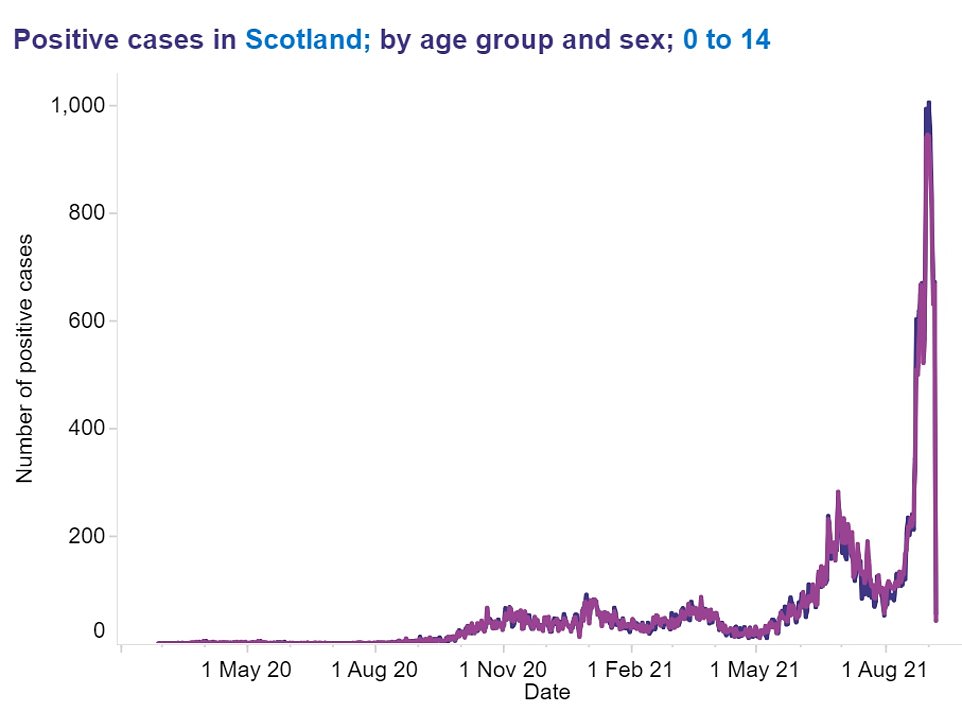
CHILDREN AGED 0 TO 14 IN SCOTLAND: This graph shows the number of Covid cases detected each day among boys aged 0 to 14 (blue line) and girls in the same age group (pink line) by specimen date, which is the date the test was carried out. The data showed Covid cases in the age group may have peaked on September 1. The line falls to near the bottom of the graph at the end because Public Health Scotland has published incomplete data between September 3 and 6. It is incomplete because it takes about a week for all tests done on a particular day to be checked for the virus. This line is expected to rise over the next few days, although it is not expected to climb steeply
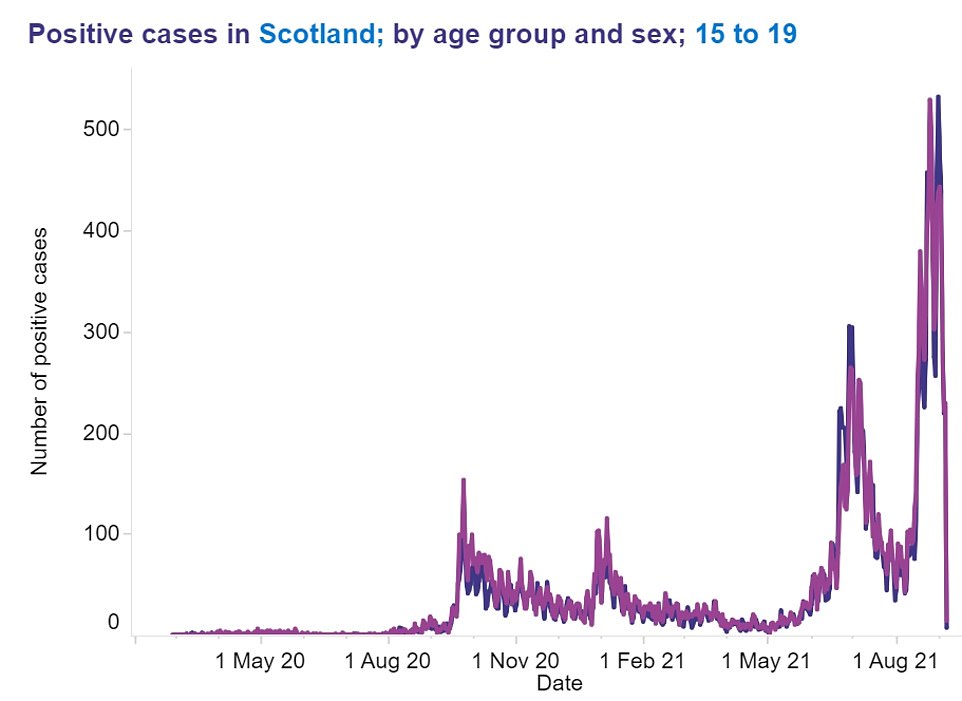
TEENAGERS AGED 15 TO 19 IN SCOTLAND: The above graph shows the number of Covid infections detected per day in boys aged 15 to 19 (blue line) and girls in the same age group (pink line). It shows that cases in both age groups are now falling sharply. The line falls to near the bottom of the graph at the end because Public Health Scotland has published incomplete data between September 3 and 6. It is incomplete because it takes about a week for all tests done on a particular day to be checked for the virus
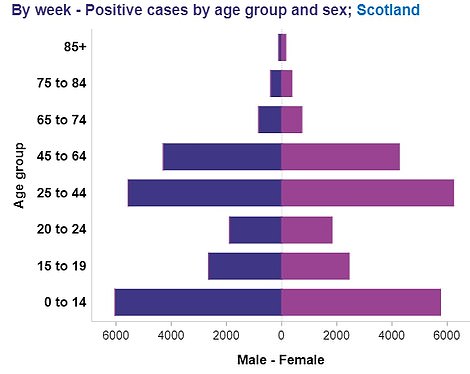

COVID CASES IN THE WEEK BEGINNING AUGUST 30 (left) AND SEPTEMBER 6 (right) BY AGE GROUP: The above graphs show the total number of Covid cases detected by age groups in Scotland for the latest two weeks that data is available. They show that cases tend to be highest among 0 to 14 year olds over the latest weeks
PHS publishes Covid cases detected in each age group by specimen date, which is when the test was carried out.
It can take up to a week for a swab to be checked for the virus and for a result to be reported, which leads to a lag in the figures published to the official dashboard.
SAGE adviser says children should have been jabbed over the summer holidays
A SAGE adviser today suggested that teenagers should have been vaccinated over the summer holidays.
Professor John Edmunds, who is also an epidemiologist at the London School of Hygiene and Tropical Medicine, warned that jabbing teenagers now would not have ‘much effect’ on suppressing a winter wave.
He told The Times: ‘Even if we started [vaccinating all teenagers] immediately it’s not going to have much of an impact on the epidemiology in the next couple of months.
‘[This is] because they will only get a single dose and one dose is not terribly effective at preventing infection with the Delta variant.
‘The biggest lever we could have pressed was to have vaccinated schoolchildren but we should have done it before they went back to school.
‘In the last six weeks, we haven’t really taken any action to prevent things taking off in the autumn, and that’s a shame.’
Experts fear England, Wales and Northern Ireland will be hit by surging cases in the coming days after schools returned from the summer holidays.
In Scotland — where children went back in mid-August — infections have already spiked to their highest levels since the pandemic began.
Advertisement
PHS Scotland data showed that among under-14s infections peaked on September 1, when 1,943 tested positive for the virus.
Cases fell six per cent the next day, the latest available, after 1,819 tested positive.
Data up to September 6 shows that infections have continued to fall in the age group, with 1,612, 1,288 and 1,335 recorded so far on the next three days.
But the delay in reporting suggests that these numbers will rise when the next updates are published, although the change is likely to only be small.
Among teenage boys aged 15 to 19 years old Covid cases peaked on August 31 when there were 532 new infections recorded.
They have since fallen by 17 per cent, after 438 infections were recorded on September 2.
This was also down a tenth on the same time last week, when 489 infections were recorded.
And among teenage girls in the age group Covid data suggests infections peaked on August 25 when 529 cases were recorded.
Since then they have dropped by almost 20 per cent after 424 cases were recorded on the latest date available.
This was a drop of 15 per cent on the same time last week when 501 cases were recorded.
The seven-day average suggests among boys in this age group there wre 314.6 cases reported every day by September 2, the lowest level since August 23 (295.3) around the time schools returned from the holidays.
Among girls in the age group the seven day average has dropped to 294.4, at its lowest level since August 21 (279.4).
The majority of Scottish schools began the autumn term between August 18 and August 19.
But PHS data suggests Covid cases in these age groups started to surge shortly before schools went back, with cases first beginning to rise around August 15. It takes several days for someone who has caught Covid to suffer symptoms and get a positive test for the virus.
The majority of schools in England, Wales and Northern Ireland began their autumn term at the start of September.
England has shelved all Covid measures except requiring pupils to swab themselves for the virus twice a week. It will also now only require children that test positive to quarantine at home for ten days, while their peers will be able to keep coming to school providing they test negative for the virus.
In Scotland testing, mask wearing and social distancing was all in place for schools when children first returned to the classroom.
It comes as top experts continue to debate whether children aged 12 to 15 should be vaccinated against the virus, but a SAGE member has already warned it may be too late to inoculate the age group.
Professor John Edmunds, who is also an epidemiologist at the London School of Hygiene and Tropical Medicine, told The Times: ‘Even if we started (vaccinating all teenagers) immediately it’s not going to have much of an impact on the epidemiology in the next couple of months because they will only get a single dose and one dose isn’t terribly effective at preventing infection with the Delta variant.
‘The biggest lever we could have pressed was to have vaccinated schoolchildren but we should have done it before they went back to school.
‘In the last six weeks we haven’t really taken any action to prevent things taking off in the autumn, and that’s a shame.’
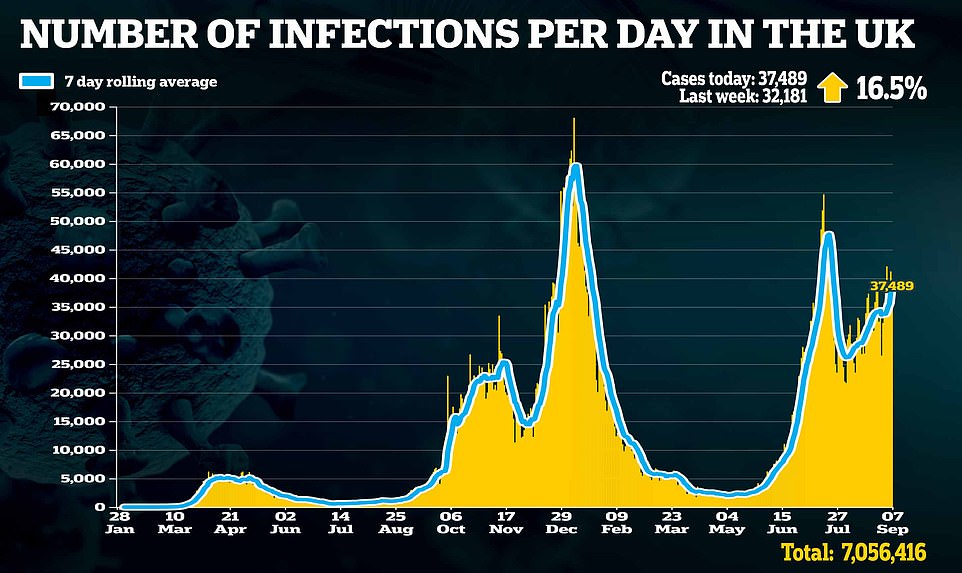
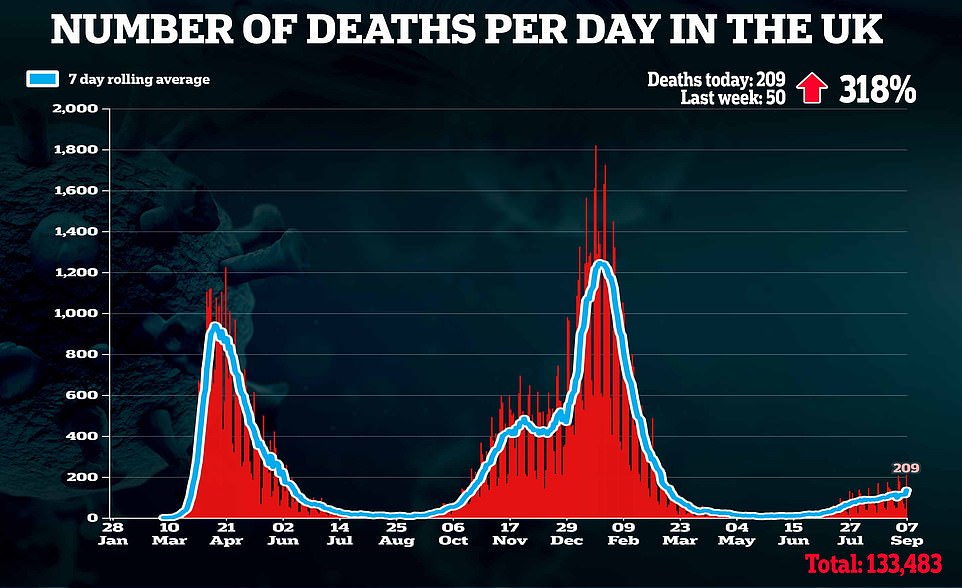
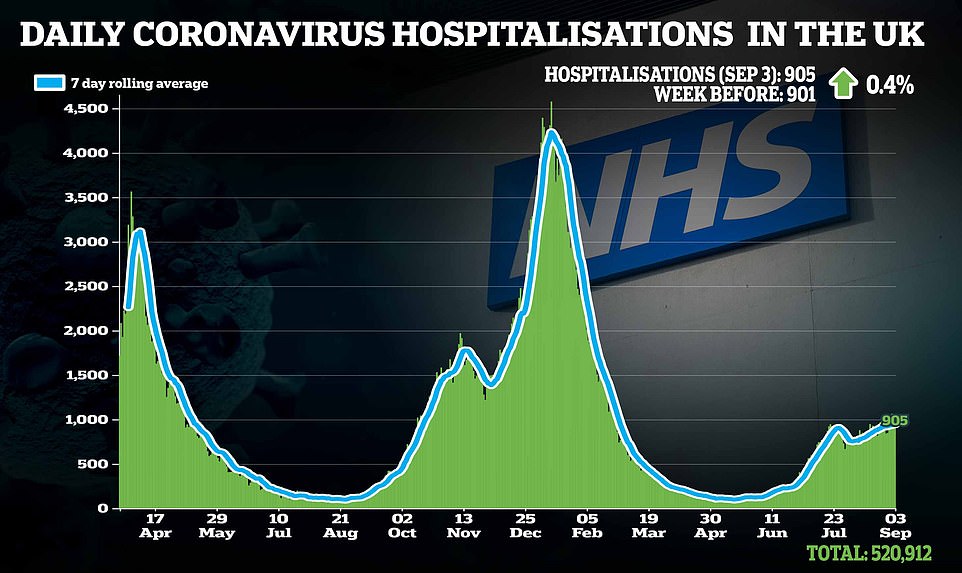
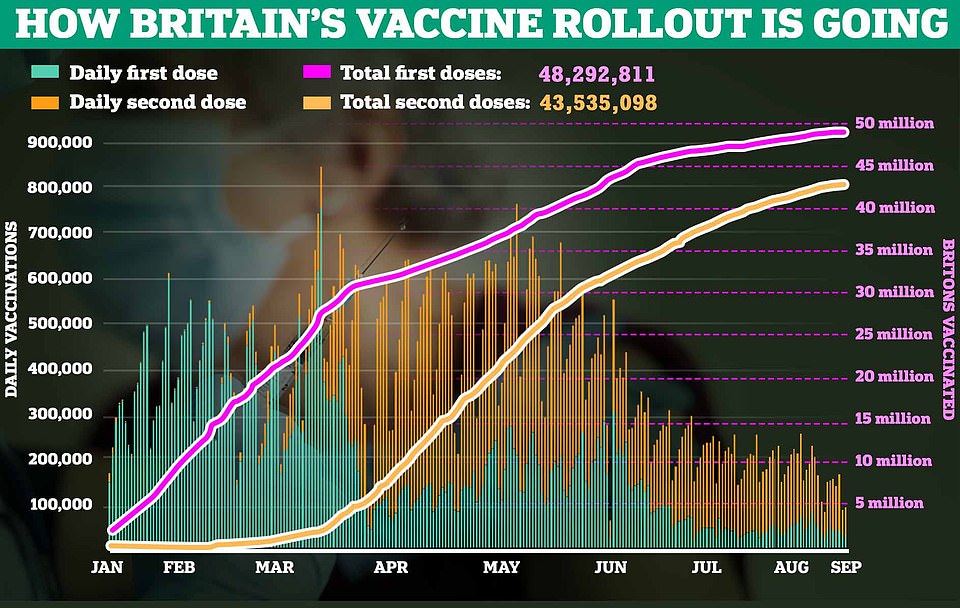
Covid vaccines reduce the risk of becoming infected with the virus, but drastically cut the chance of being hospitalised and dying from the disease.
Dr David Strain, a chief at the British Medical Journal, predicted on Monday that the vaccines would only cut the risk of getting infected with the virus by 20 per cent amid the spread of the more infectious Delta variant.
Ministers have made no secret of the fact they want to inoculate the age group, with the NHS ordered to have plans ready to roll out the doses from last week.
If approved, children are expected to be offered either the Pfizer or Moderena jabs in schools.
Scientists are divided over whether 12 to 15-year-olds should get the Covid vaccine, with some SAGE members backing the move yesterday arguing it would help to head off a surge in infections later this winter.
But others have argued it would be ethically dubious to inoculate the age group when millions of people in poorer countries are still waiting to be vaccinated.
Source link : https://www.dailymail.co.uk/news/article-9969043/Covid-cases-school-pupils-Scotland-plummeting-already.html











